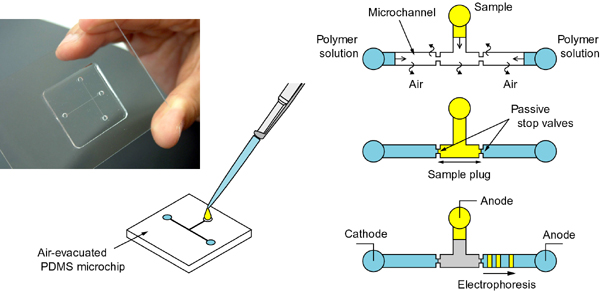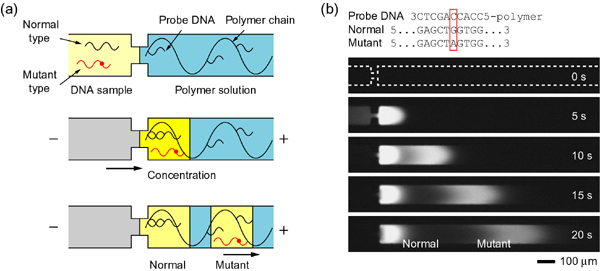Easy SNPs typing on an autonomous
microchip
|
Human genomic variation
is now becoming important information for prevention and treatment of
diseases. The most common form of the variation is single-nucleotide
polymorphism (SNP) which means substitution of a single base. We are now
developing rapid and reliable methods for typing of SNPs. Here we introduce
such a method including two original technologies: "autonomous
microchip" and "affinity electrophoresis."
The autonomous
microchip is made of silicone elastomer: poly(dimethylsiloxane) (PDMS). PDMS
has a high gas solubility that we exploited for autonomous formation of a
liquid-liquid interface between sieving polymer matrix and sample solution in
a microchannel. For affinity electrophoresis, a probe DNA is immobilized to
the sieving polymer matrix. Migrating through the matrix, sample DNA is
concentrated and separated by interaction with the probe DNA. With this
method, we can concentrate two 60-base DNAs by a factor of 100, and can separate
them by a single-base substitution.
|
Reference
|
(1) |
Ito,
T., Inoue, A., Sato, K., Hosokawa, K., and Maeda, M.: “Autonomous polymer loading
and sample injection for microchip electrophoresis” Analytical Chemistry, 77, 4759-4764
(2005). |
|
(2) |
Ito,
T., Inoue, A., Sato, K., Hosokawa, K., and Maeda, M.: "Affinity
capillary electrophoresis in a poly(dimethylsiloxane)-glass hybrid
microchip" Chem. Lett. 32, 688-689 (2003). |

